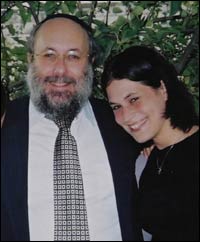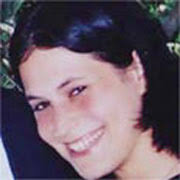


In memory of Dr. David Applebaum and his daughter Nava Applebaum
Dr. David Applebaum was born in Detroit, US, 9th of Tevet, 5713 (December 27, 1952). Nava Applebaum was born in Jerusalem, 11th of Adar, 5743 (February 24. 1983). Both fell in Jerusalem, 12th of Elul, 5763 (September 9, 2003)
Dr. David Applebaum and his daughter Nava were not afraid of challenges. They believed that change could appear even in the most difficult situations. He established an emergency medical service and she volunteered at a pediatric oncology department. A day before her wedding, they were murdered in a terrorist attack at Café Hillel in Jerusalem.
David Applebaum was born in the US to a very religious and very Zionist family. In 1972, he completed a degree in Psychology and two years later a graduate degree in Biology. He continued on to medical school and in 1978 was certified as an MD at Ohio University. After his studies, he specialized in Internal Medicine at Mount Sinai Medical Center in Cleveland, Ohio and was also certified as a specialist in emergency medicine. In 1977, David married Devorah; in 1981 they made aliyah and settled in Jerusalem.
 David Appelbaum z"l and his daughter Nava z"l |
David was an energetic individual; his activities led to changes in emergency medicine. His achievements were due to his good interpersonal relations with the staff and to his knowing of how to overcome any challenge he encountered (from a puddle in the office that no one cleaned up to a patient who only had a five percent chance of survival).
When David made aliyah, he operated an intensive care ambulance in Jerusalem and administered a clot-dissolving drug already in the home of the patient, before arriving at the hospital. During his work at the ER of Shaarei Tsedek, he understood that many of the patients should not be there and this understanding led him to establish Terem—an emergency medical center which a patient could go to before arriving at the ER so as to receive quick initial treatment. The Terem centers became very popular.
Dr. Applebaum claimed that if the medical team managed to raise the patient’s spirits, their chances of recovery were improved. He even told divrei Torah to some of his patients in order to distract them from their pain.
On September 9, 2003, a suicide bomber blew himself up in Café Hillel on Emek Refaim Street in the German Colony neighborhood of Jerusalem. Seven people were killed, including David and his daughter Nava, who was meant to be married the next day.
Dr. David Applebaum was 50 years old. He left behind a wife, two sons and three daughters (Natan, Yitzchak, Shira, Sheina and Tobi-Bella) and a sister. He was laid to rest in the Har Menuhot Cemetery in Jerusalem, beside his daughter.
Nava was born in 1983 in Cleveland, Ohio. She made aliyah with her parents David and Devora and her sister and they settled in Jerusalem. Nava was kindhearted and generous. When she finished her studies at the Horev Ulpana in Jerusalem, she volunteered for National Service in Hadera and for another year at Zichron Menahem, a support center for children with cancer. Nava would cheer up the children with her costumes. She wanted to share her joy with the children and she invited those that were well enough to her wedding, along with their parents. On the morning of her wedding day, she planned a party at the department itself for the children that were unable to come. They waited for her in the morning with anticipation but she did not arrive.
 Nava z"l |
Interview with Shaina Appelbaum who talks about her father David and sister Nava
Thoughts from Sivan Kidron who directed the film
The story of Nava and David Applebaum churned up my stomach. There is no real way to rank tragedies but this is nonetheless an awful and charged tragedy, since it is a double catastrophe—a father and his daughter on the day before her wedding.
What touched me more than anything in the story is the reversal of fate, which happens so quickly and unexpectedly. It is unimaginable: to wake up to a day of joy and emotion before a wedding and within a moment to fall into the abyss, without any warning.
It was important that the clip would convey this feeling of a dizzying fall from the highest point to the most awful place. From great happiness and the start of a new life, a feeling of beginning, to a sudden and unexpected end. I chose to make the film in black and white in order to emphasize this reversal. What starts as clear and clean gradually becomes darker as the clip progresses. I chose a cinema language that minimizes cuts and makes use of smooth transitions from one thing to another, in order to convey a feeling of the continuity of the wedding preparations and the excitement, on a day that no one imagined would end that way.
There is real separation, no warning—everything is part of the flow of daily activities that are tragically cut off. I tried to create a feeling of dizziness, of movement that begins in one place and suddenly ends in a totally different place and you don’t understand what has happened.
I called the clip “Chessed”, "Grace" first of all because Nava and David filled their lives with chessed—David in the ER in Shaarei Tsedek and Nava as a volunteer in the Pediatric Oncology Department in Hadassah Ein Karem. They took care of people, they cared about people, they touched the lives of those who were in need of help and healing and therefore there is also a very strong motif of hands in the clip.
In addition, I wanted to hint at the chessed that didn’t happen—the grace of marriage and the start of life and the fragile chessed of life in general.